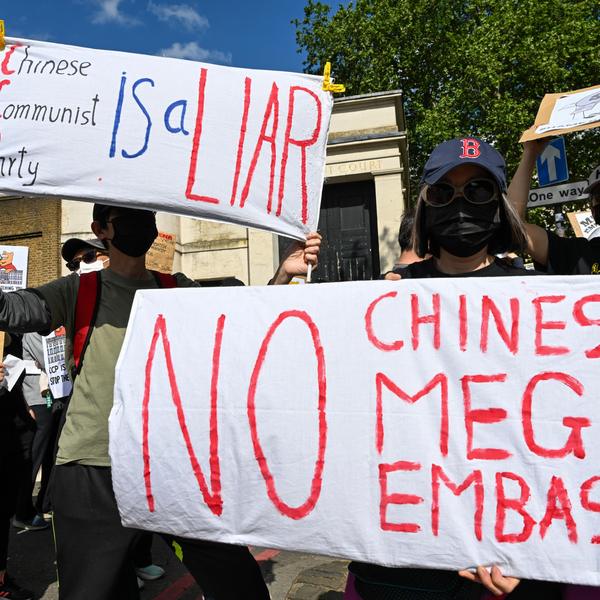In President Donald Trump’s first 100 days, his administration has arrested and detained, without due process, visa holders and other non-citizens in the U.S. for speaking out against Israel’s military actions in Gaza.
That’s not how the administration frames it, but that is the connective tissue in each of the cases.
On Wednesday, the same day Palestinian Columbia University student Mohsen Mahdawi was released on bail pending a Habeas hearing after a judge determined that he did not pose a risk to the public, Republican Senator Rand Paul of Kentucky blasted the Congress for pushing new speech restrictions, particularly antisemitism measures that would restrict criticism of Israel on school campuses.
“We’re either a free society governed by the Constitution, or we’re not. We need to challenge hate with reason, not censorship.”
Paul was specifically addressing the Antisemitism Awareness Act which would codify a Trump-era executive order declaring that antisemitism is a prohibited form of discrimination in schools and universities, and would use the International Holocaust Remembrance Alliance’s working definition of antisemitism in assessing cases of antisemitic discrimination through the Department of Education.
Critics say that it would allow the government to conflate criticism of Zionism and the Israeli government with antisemitism and serve as a dangerous tool to shut down free speech. Paul wondered aloud if campus police would be used in enforcing new speech rules, and how.
As The Jewish Chronicle reported after the vote was postponed, Sen. Paul was part of “a testy hearing on Wednesday that covered objections to the bill ranging from whether a Christian would be barred from saying that Jews killed Jesus, to the acceptability of making contemporary political allusions to Nazi Germany and even the comedy of Jerry Seinfeld and Joan Rivers.”
Paul cited the landmark 1969 Brandenburg v. Ohio case, in which Ku Klux Klan member Clarence Brandenburg was convicted under two Ohio laws of allegedly inciting violence against Jews and African-Americans with his speech.
Brandenburg claimed that his punishment violated the First Amendment. The Supreme Court agreed with him.
“Brandenburg was a Nazi and an antisemite and he said horrible things,” Paul said. “And the First Amendment, the Constitution, the Supreme Court ruled that you can say terrible things.”
The senator compared the American concept of free speech with Europe’s recent crackdowns on speech.
“That’s unique about our country,” Paul said. “In Europe, you can’t say anything. In Europe, if you call a boy who thinks he’s a girl a boy, you can go to jail for that. If you say something about the Holocaust in Europe, you can go to jail.”
To Paul’s point, in 2019, 38-year-old Kate Scottow of Hertfordshire, England, was arrested for “misgendering” a transgender individual. Last year, 61-year-old Neal Lloyd of England was arrested over his Facebook posts about the Israel-Palestine conflict.
Do we want to replicate Europe’s speech laws in the U.S.? Paul raised the question.
“This is what we’re doing,” he insisted. “We’re codifying what Europe did to speech. It’s a terrible idea.”
The Congressional debate is taking place as non-citizen students have been snatched away ostensibly for what they said or wrote about Israel.
The State Department had accused Mahdawi, the former co-president of Columbia University’s Palestinian Student Union, of using “threatening rhetoric and intimidation” against Jewish students during a protest on campus in 2024. A 34-year-old permanent resident of the U.S. who was born and raised in a Palestinian refugee camp in the West Bank before moving to the U.S. and going to Columbia University, Mahdawi was detained by ICE agents while at his naturalization hearing in Vermont on April 14. He was never formally charged with a crime.
We don't know if the other non-citizen students detained by immigration authorities in the last month have actually been involved in threats or intimidation, or even genuine antisemitism, or real support for Hamas, because the administration has been deliberately vague about its reasons for detaining them. Secretary of State Marco Rubio says the administration has the right to deport non-citizens when their "presence and activities in the United States would have serious adverse foreign policy consequences and would compromise a compelling U.S. foreign policy interest."
He is invoking a little-used clause in the Immigration and Nationality Act, which stipulates that the Secretary of State can determine what kind of activity rises to the level of having “potentially serious adverse foreign policy consequences” for the country.
Mahdawi may be the lucky one. Others are still in detention awaiting hearings.
Columbia University graduate Mahmoud Khalil claims he was arrested on March 8 for a speech he gave during campus protests, though he too was never charged with anything. A judge has said the administration’s attempt to deport him will be decided in court.
Tufts University graduate student Rumeysa Ozturk was snatched off the street near her home in Somerville, Massachusetts, on March 25 for what appears to be an op-ed she wrote for the school newspaper criticizing Israel's war on Gaza, and still awaits potential deportation. Badar Khan Suri, a postdoctoral fellow at Georgetown and an Indian national, was arrested by federal agents in March. He has been accused by Department of Homeland Security officials of spreading Hamas propaganda, something his family and supporters vehemently deny.
In each of these cases, the detainees’ support for the Palestinians’ plight and criticism of Israel’s war in Gaza appear to be the primary reasons behind their arrests, which is illegal according to the U.S. Constitution.
But if America did ignore the First Amendment and allowed rigid UK-style speech laws instead, how far would it go? Do the purveyors of the new antisemitism speech legislation on Capitol Hill know that this could boomerang on them when their ideological opponents someday get back into power?
As journalist Glenn Greenwald observed about the antisemitism legislation, “this is not a hate speech code applying to foreign nationals. It's a hate speech code that applies to American citizens, American faculty members, where people can be punished for the expression of ideas on college campuses cheered for by the right wing faction that has long claimed there's nothing worse than hate speech codes and other forms of suppression of ideas on college campuses.”
Carving out one country in the world and making it forbidden to criticize its government is the complete antithesis of the Constitution’s protections and a betrayal of the American tradition. The First Amendment allows anyone on American soil to critique the U.S. government, but now condemning a foreign government could land you in jail or deported to another country?
On what grounds? By what logic? By whose laws?
Rand Paul is right. One would think that putting America first might include putting its First Amendment first, too.
















